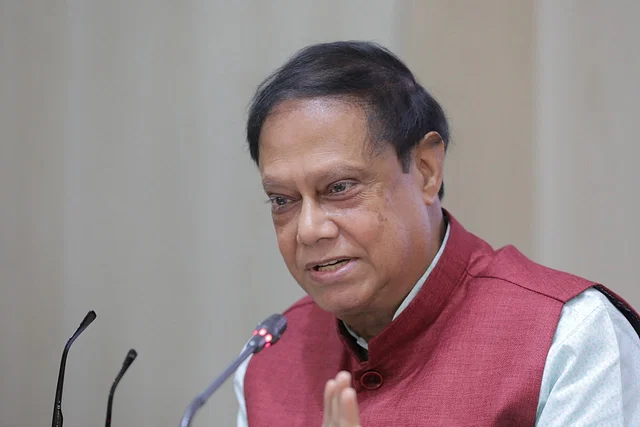বৃহস্পতিবার, ০৫ ফেব্রুয়ারী ২০২৬, ০৭:০৮ পূর্বাহ্ন

Ahsan H Mansoor, executive director of the private research institute Policy Research Institute (PRI), commented that the economy cannot be destroyed while protecting weak banks.
This economist said, ‘Policy must be retained; Can’t move away. Funding is being provided to commercial banks which are in liquidity crunch due to their own causes. That means, holding one hand; Leaving in another hand. But then it won’t happen. Bangladesh Bank should stop providing this liquidity.’
He said these words in a discussion on the proposed budget for the next financial year 2024-25 organized jointly by Metropolitan Chamber of Commerce and Industry (MCCI) and PRI. Prime Minister’s economic advisor Mosiur Rahman was the chief guest.
The discussion was held on Wednesday at the office of the Metro Chamber at Police Plaza in Gulshan. President of Metro Chamber Kamran T Rahman gave a welcome speech. Among others, PRI Chairman Zayedi Sattar, Metro Chamber Tariff and Taxation Committee member Adib H Khan spoke. Habibullah N Karim, Vice President of Metro Chamber moderated.
Ahsan H. Mansoor said, ‘Despite the small size of the budget, there remains a huge problem in financing. The big problem is that the government has to take money from the banking sector. We have no objection. But the banking sector is not strong. The banking sector is weak. The growth of deposits in the current financial year is 10 percent. It was less than last year. In the previous year, there was a growth of 7 and a half percent. If there is a 10 percent growth this time, then 1 lakh 70 thousand crores of deposits will come. If the government takes Tk 1 lakh 35 thousand crores from there, then 20 percent remains for the private sector. If the government takes 80 percent of the loan from the banking sector alone, then the country cannot run.’
Addressing the government, Ahsan H. Mansoor said, ‘You are trying to reduce expenditure. Government expenditure was cut by another 50 thousand crore rupees. He brought the loan amount from the bank to 90 thousand crores. Then the private sector will get another 80-90 thousand crore rupees. It will bring a balance.’
Addressing the private sector, Ahsan H. Mansoor said, ‘You should not depend only on the domestic banking system. You arrange to take loans from abroad. He took it before. The private sector borrowed $24 billion. Now it has reduced to 12 billion dollars. If we can’t increase it, then two problems remain. One. The amount of personal sector loans will be less. Two. If we can make the country’s financial account positive, then the problem of balance of transactions will be solved. Our foreign exchange reserves will gradually increase. The main reason for the decrease in reserves is the negative financial balance. The main reason is the debt repayment of the private sector. You have to take more loans. By following this strategy, the transaction balance will be correct. We can reduce inflation. Debt management between the government and the private sector will also be harmonized. Overall that’s good for the economy.’
Ahsan H. Mansoor said about the reform of the banking sector, ‘There is nothing in the budget about reforms. But reform must be done. It remains outstanding for a long time. The government is not able to expand the banking sector. But it has planned to take a loan of 1 lakh 35 thousand crores from the banking sector. Although India is borrowing 10 times more. Because their banking sector is big. Our banking sector is small. If we are not able to move away from the fragile state of the banking sector, the private sector will not get the credit support that way. The government will not get either. So where do we go? We cannot survive only on foreign loans. So you must pay attention to the banking sector. Policy paralysis will not be allowed.’ He said, ‘The consolidation of the banking sector has stalled. We have to do something.’
Ahsan H Mansoor commented that despite the ambitious revenue target, the tax-to-GDP ratio will remain below 8 percent. He said, ‘India’s tax to GDP ratio is 18 percent. We have to go there too. So fundamental reforms are needed here. In particular, attention should be paid to tax administration. Automation has to be done. If we can take the tax-GDP ratio to 18 percent in 5-10 years, we will have no deficit. Then we can double the expenditure on education sector. I can spend three times in the health sector. Tax-GDP ratio is 18-22 percent in many countries of the world. Over 20 percent in countries like Nepal. Why should we sit at 7-8 percent.’